
Der Graf von Luxemburg is an operetta in three acts by Franz Lehár to a German libretto by Alfred Willner, Robert Bodanzky, and Leo Stein. A Viennese take on bohemian life in Paris at the beginning of the 20th century, the story revolves around an impoverished aristocrat and a glamorous opera singer who have entered into a sham marriage without ever seeing each other and later fall in love at first sight, unaware that they are already husband and wife.
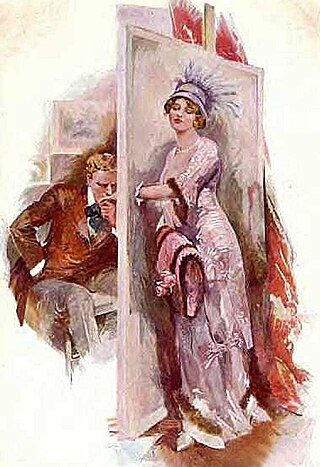
The Count of Luxembourg is an operetta in two acts with English lyrics and libretto by Basil Hood and Adrian Ross, music by Franz Lehár, based on Lehár's three-act German operetta Der Graf von Luxemburg which had premiered in Vienna in 1909. Lehár made amendments to his Viennese score to accommodate the two-act adaptation. He also interpolated into the score three new pieces: a waltz that he had written for a commemorative performance of Der Graf in Vienna; a song from his first operetta, Wiener Frauen; and a Russian dance from the opera Tatjana.

Camille is a 1917 American silent film based on the play adaptation of La Dame aux Camélias by Alexandre Dumas, fils, first published in French as a novel in 1848 and as a play in 1852. Adapted for the screen by Adrian Johnson, Camille was directed by J. Gordon Edwards and starred Theda Bara as Camille and Albert Roscoe as her lover, Armand.

The Prussian Cur is a 1918 American anti-German silent propaganda film produced during World War I. Now considered a lost film, it is notable for telling the story of the Crucified Soldier.

On Approval is a 1944 British romantic comedy film, produced, directed and cowritten by Clive Brook. The film stars Brook, Beatrice Lillie, Googie Withers and Roland Culver. It is the second film adaptation of the play On Approval by Frederick Lonsdale; the first was a 1930 film of the same name.

The Lucky Lady is a 1926 American silent romance film produced by Famous Players–Lasky, distributed by Paramount Pictures, directed by Raoul Walsh, and starring Greta Nissen, Lionel Barrymore, William Collier, Jr., and Marc McDermott.

The Beautiful Adventure is a 1917 American silent drama film starring Ann Murdock, a stage star. The film is based on the 1913 Broadway stage play The Beautiful Adventure in which Murdock had starred. The film was directed by Dell Henderson and released through the Mutual Film company. It is a lost film.

On the Quiet is a lost 1918 American silent comedy film produced by Famous Players–Lasky and released by Paramount Pictures. It was directed by Chester Withey and starred John Barrymore. The film, based on an original 1901 play, was written by Augustus Thomas and served as a popular hit for William Collier, Sr.

Men was a 1918 American silent drama film directed by Perry N. Vekroff based upon a play by Harry Sophus Sheldon. It starred Anna Lehr, Charlotte Walker, and Robert Cain. It is considered to be a lost film.
The Bride's Awakening is a 1918 American silent drama film released by Universal Pictures and produced by their Bluebird production unit. Robert Z. Leonard directed the film and his then-wife Mae Murray was the star. A print of the film is housed at the EYE Institute Nederlands.
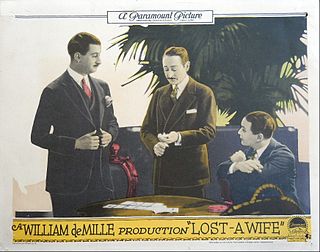
Lost: A Wife is a 1925 American silent comedy film directed by William C. deMille and written by Clara Beranger based upon a play by Clare Kummer and Alfred Savoir. The film stars Adolphe Menjou, Greta Nissen, Robert Agnew, Edgar Norton, Mario Carillo, and Genaro Spagnoli. The film was released on July 13, 1925, by Paramount Pictures.

Deserted at the Altar is a 1922 American silent film melodrama directed by William K. Howard and produced by Phil Goldstone Productions. It stars Bessie Love and Tully Marshall.

Shackles of Gold is a 1922 American silent drama film directed by Herbert Brenon and starring William Farnum, Alfred Loring, and Marie Shotwell. It is an adaptation of the 1908 play Samson by Henri Bernstein with the setting moved from France to America. The screenplay involves a woman from an aristocratic but poor family who is pressured by her relatives to marry a wealthy financier.

Mr. Barnes of New York is a 1922 American silent drama film directed by Victor Schertzinger and starring Tom Moore, Anna Lehr and Naomi Childers. It is an adaptation of the novel of the same name by Archibald Clavering Gunter, which had previously been turned into a 1914 film.
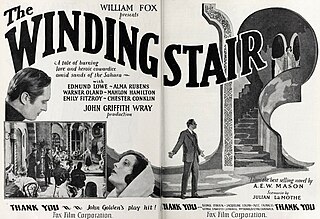
The Winding Stair is a lost 1925 American silent drama film directed by John Griffith Wray and starring Alma Rubens, Edmund Lowe, and Warner Oland. It is based on the 1923 novel of the same name by the British writer A.E.W. Mason.

The Girl from Montmartre is a 1926 American silent romantic drama film directed by Alfred E. Green and starring Barbara La Marr in her last film role. It was distributed through First National on the day after La Marr died.
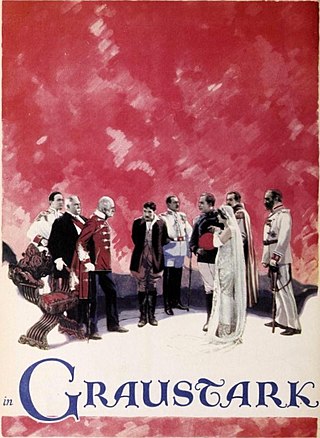
Graustark is a 1925 American silent romantic adventure film produced by Dimitri Buchowetzki for Norma Talmadge Productions and distributed by First National. It is based on the novel Graustark by George Barr McCutcheon. It was directed by Dimitri Buchowetzki with Norma Talmadge as the leading woman.

Wild Oats Lane is a lost 1926 American silent drama film directed by Marshall Neilan and starring Viola Dana, Robert Agnew, and John MacSweeney.

Helen Lee Worthing was an American actress, mostly active in the era of silent film.
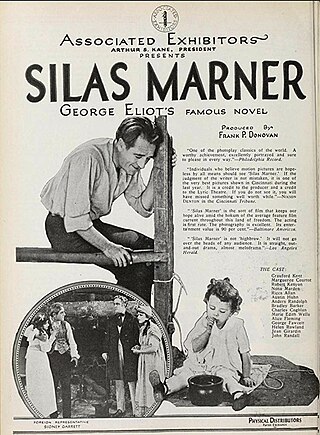
Silas Marner is a 1922 American silent historical drama film directed by Frank P. Donovan and starring Crauford Kent, Marguerite Courtot, and Robert Kenyon. It is an adaptation of the 1861 novel of the same name by George Eliot.



















